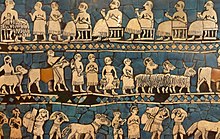
Back Beskawing Afrikaans Zivilisation ALS ሥልጣኔ Amharic Civilización AN Folctilþ ANG حضارة Arabic حضاره ARZ Civilización AST Цивилизация AV Sivilizasiya Azerbaijani


A civilization (also spelled civilisation in British English) is any complex society characterized by the development of the state, social stratification, urbanization, and symbolic systems of communication beyond signed or spoken languages (namely, writing systems and graphic arts).[2][3][4][5][6]
Civilizations include features such as agriculture, architecture, infrastructure, technological advancement, currency, taxation, regulation, and specialization of labour.[5][6][7]
Historically, a civilization has often been understood as a larger and "more advanced" culture, in implied contrast to smaller, supposedly less advanced cultures.[8][9][10][11] In this broad sense, a civilization contrasts with non-centralized tribal societies, including the cultures of nomadic pastoralists, Neolithic societies, or hunter-gatherers; however, sometimes it also contrasts with the cultures found within civilizations themselves. Civilizations are organized densely-populated settlements divided into hierarchical social classes with a ruling elite and subordinate urban and rural populations, which engage in intensive agriculture, mining, small-scale manufacture and trade. Civilization concentrates power, extending human control over the rest of nature, including over other human beings.[12]
The word civilization relates to the Latin civitas or 'city'. As the National Geographic Society has explained it: "This is why the most basic definition of the word civilization is 'a society made up of cities.'"[13] The earliest emergence of civilizations is generally connected with the final stages of the Neolithic Revolution in West Asia, culminating in the relatively rapid process of urban revolution and state formation, a political development associated with the appearance of a governing elite.
- ^ "Chronology". Digital Egypt for Universities. University College London. 2000. Archived from the original on 16 March 2008.
- ^ Haviland, William; et al. (2013). Cultural Anthropology: The Human Challenge. Cengage Learning. p. 250. ISBN 978-1-285-67530-5. Archived from the original on 13 July 2019. Retrieved 20 June 2015.
- ^ Fernández-Armesto, Felipe (2001). Civilizations: Culture, Ambition, and the Transformation of Nature. Simon & Schuster. ISBN 978-0-7432-1650-0. Archived from the original on 1 April 2021. Retrieved 20 June 2015.
- ^ Boyden, Stephen Vickers (2004). The Biology of Civilisation. UNSW Press. pp. 7–8. ISBN 978-0-86840-766-1. Archived from the original on 30 December 2016. Retrieved 20 June 2015.
- ^ a b Solms-Laubach, Franz (2007). Nietzsche and Early German and Austrian Sociology. Walter de Gruyter. pp. 115, 117, 212. ISBN 978-3-11-018109-8. Archived from the original on 30 December 2016. Retrieved 20 June 2015.
- ^ a b AbdelRahim, Layla (2015). Children's literature, domestication and social foundation: Narratives of civilization and wilderness. New York: Routledge. p. 8. ISBN 978-0-415-66110-2. OCLC 897810261.
- ^ Morris, Ian (2013). The Measure of Civilization: How Social Development Decides the Fate of Nations. Princeton: Princeton University Press. ISBN 978-0-691-15568-5. Archived from the original on 29 May 2023. Retrieved 29 May 2023.
- ^ Adams, Robert McCormick (1966). The Evolution of Urban Society. Transaction Publishers. p. 13. ISBN 978-0-202-36594-7. Archived from the original on 30 December 2016. Retrieved 20 June 2015.
- ^ Wright, Ronald (2004). A Short History anthropological. House of Anansi Press. ISBN 978-0-88784-706-6.
- ^ Llobera, Josep (2003). An Invitation to Anthropology. Berghahn Books. pp. 136–137. ISBN 978-1-57181-597-2. Archived from the original on 30 December 2016. Retrieved 20 June 2015.
- ^ Bolesti, Maria (2013). Barbarism and Its Discontents. Stanford University Press. ISBN 978-0-8047-8537-2. Archived from the original on 21 November 2023. Retrieved 20 June 2015.
- ^ Mann, Michael (1986). The Sources of Social Power. Vol. 1. Cambridge University Press. pp. 34–41.
- ^ "Civilizations". National Geographic Education. National Geographic Society. 20 May 2022. Archived from the original on 29 May 2023. Retrieved 29 May 2023.